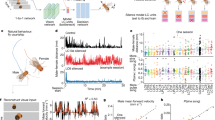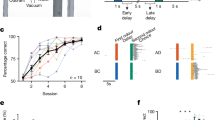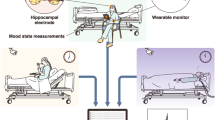Abstract
SINCE July 1959 we have been recording spontaneous potentials from explants of brain in tissue culture. The tissue used was cerebellum from chick embryos of 8 days incubation and older. The supernatant was a 0.25 per cent solution of human serum protein in a physiologically balanced salt solution. The composition of the physiological balanced salt-solution is as follows :  The other techniques were those described in publications from this laboratory1–3.
The other techniques were those described in publications from this laboratory1–3.
This is a preview of subscription content, access via your institution
Access options
Subscribe to this journal
Receive 51 print issues and online access
$199.00 per year
only $3.90 per issue
Buy this article
- Purchase on Springer Link
- Instant access to full article PDF
Prices may be subject to local taxes which are calculated during checkout
Similar content being viewed by others
References
Cunningham and Estborn, Lab. Invest., 7, 156 (1958).
Estborn, Cunningham, et al., Lab. Invest., 7, 524 (1958).
Cunningham and Herbst, Lab. Invest. (in the press).
Author information
Authors and Affiliations
Rights and permissions
About this article
Cite this article
CUNNINGHAM, A., DOUGHERTY, M. & RYLANDER, B. Spontaneous Potentials from Explants of Brain Tissue in Culture. Nature 186, 477–478 (1960). https://doi.org/10.1038/186477a0
Issue Date:
DOI: https://doi.org/10.1038/186477a0
This article is cited by
-
The effect of temperature variation on spontaneous potential production from explants of brain tissue in culture
Experientia (1962)
-
Spontaneous potentials from explants of peri-aortic (Paraganglia) tissue in culture
Die Naturwissenschaften (1962)
-
Spontaneous Potentials from Explants of Human Adult Cerebellum in Culture
Nature (1961)
-
Spontaneous Potentials from Explants of Chick Cerebral Hemisphere (Telencephalon) in Tissue Culture
Nature (1961)
-
Spontaneous potentials from explants of embryo chick pons (myelencephalon) in culture
Experientia (1961)
Comments
By submitting a comment you agree to abide by our Terms and Community Guidelines. If you find something abusive or that does not comply with our terms or guidelines please flag it as inappropriate.



